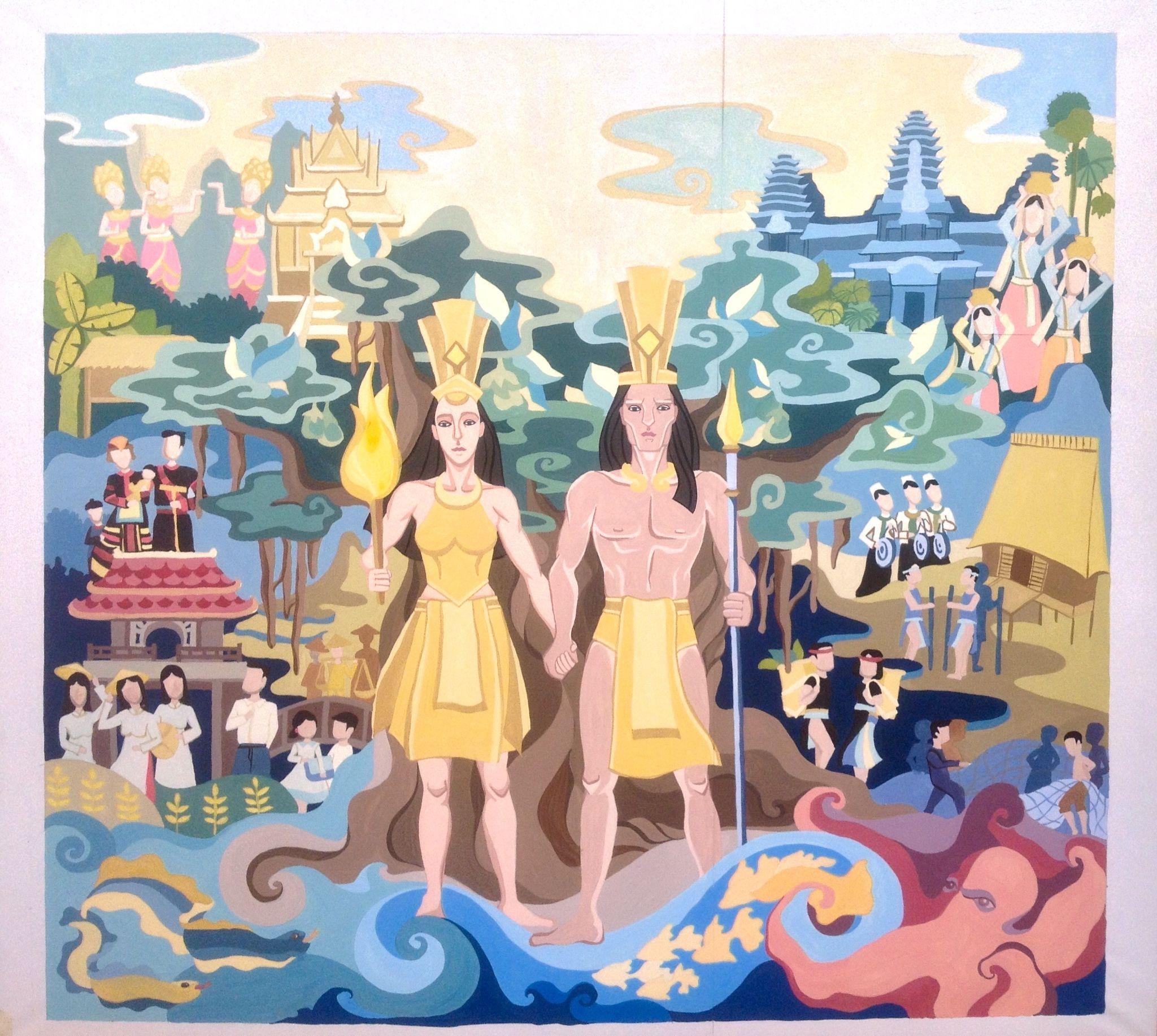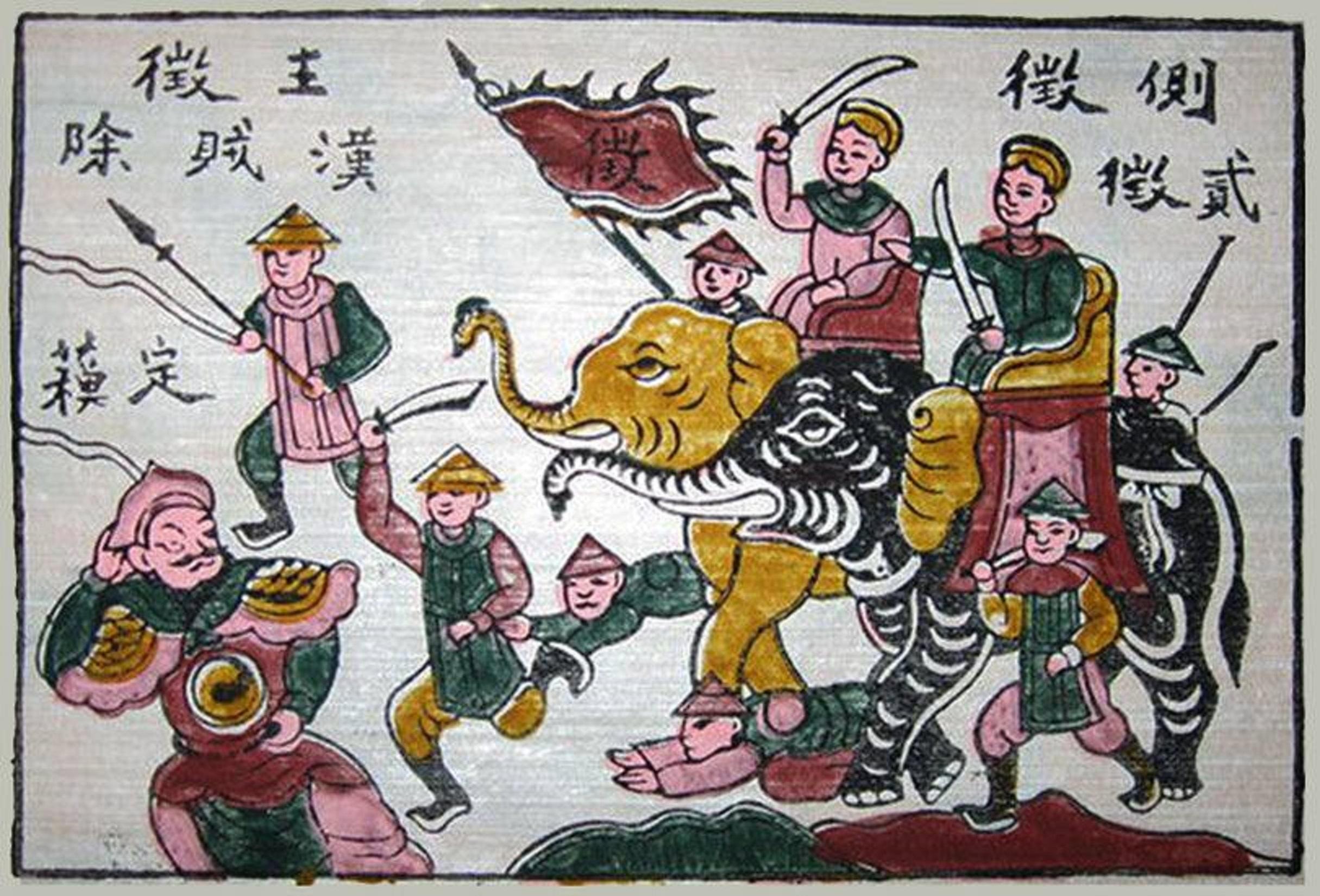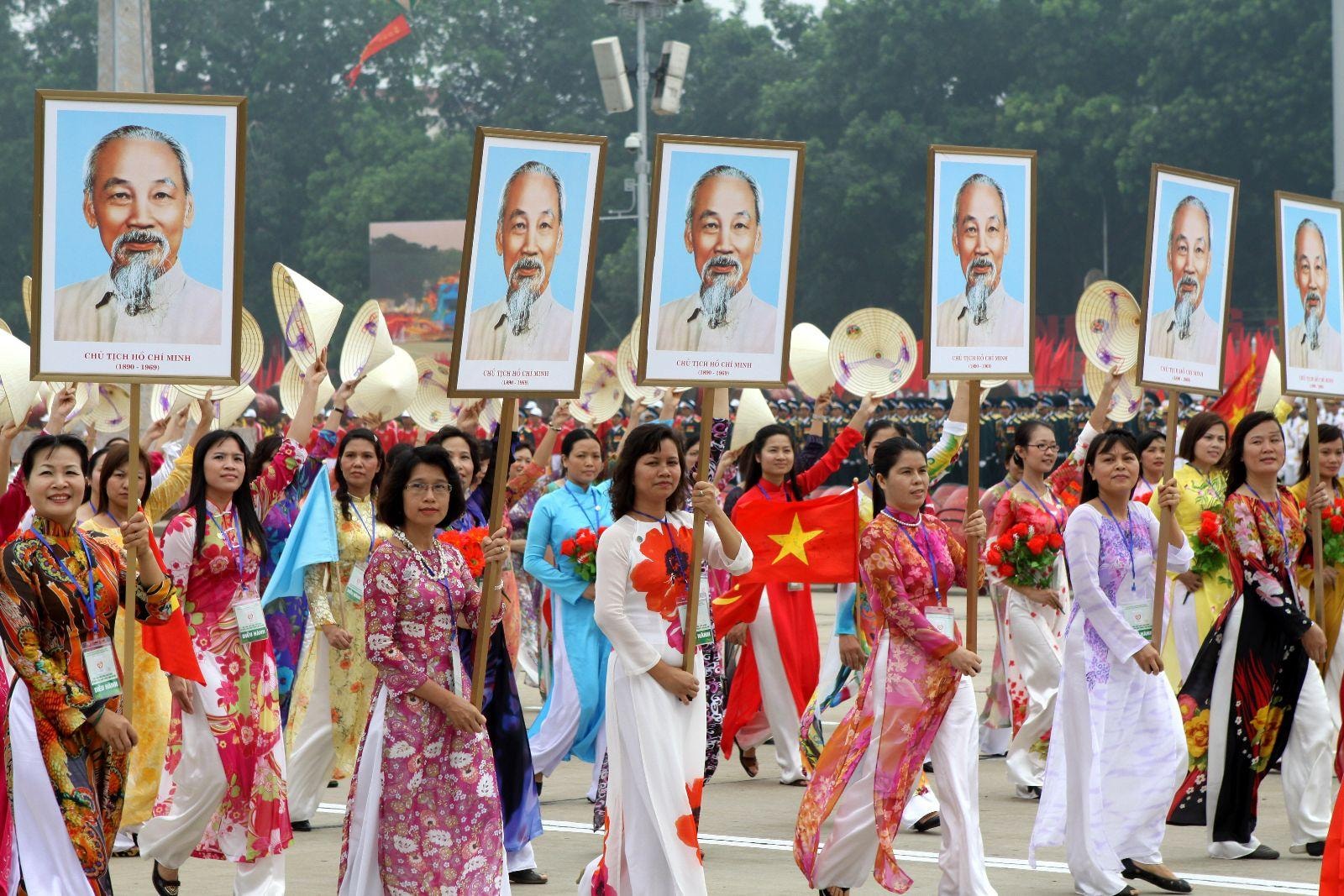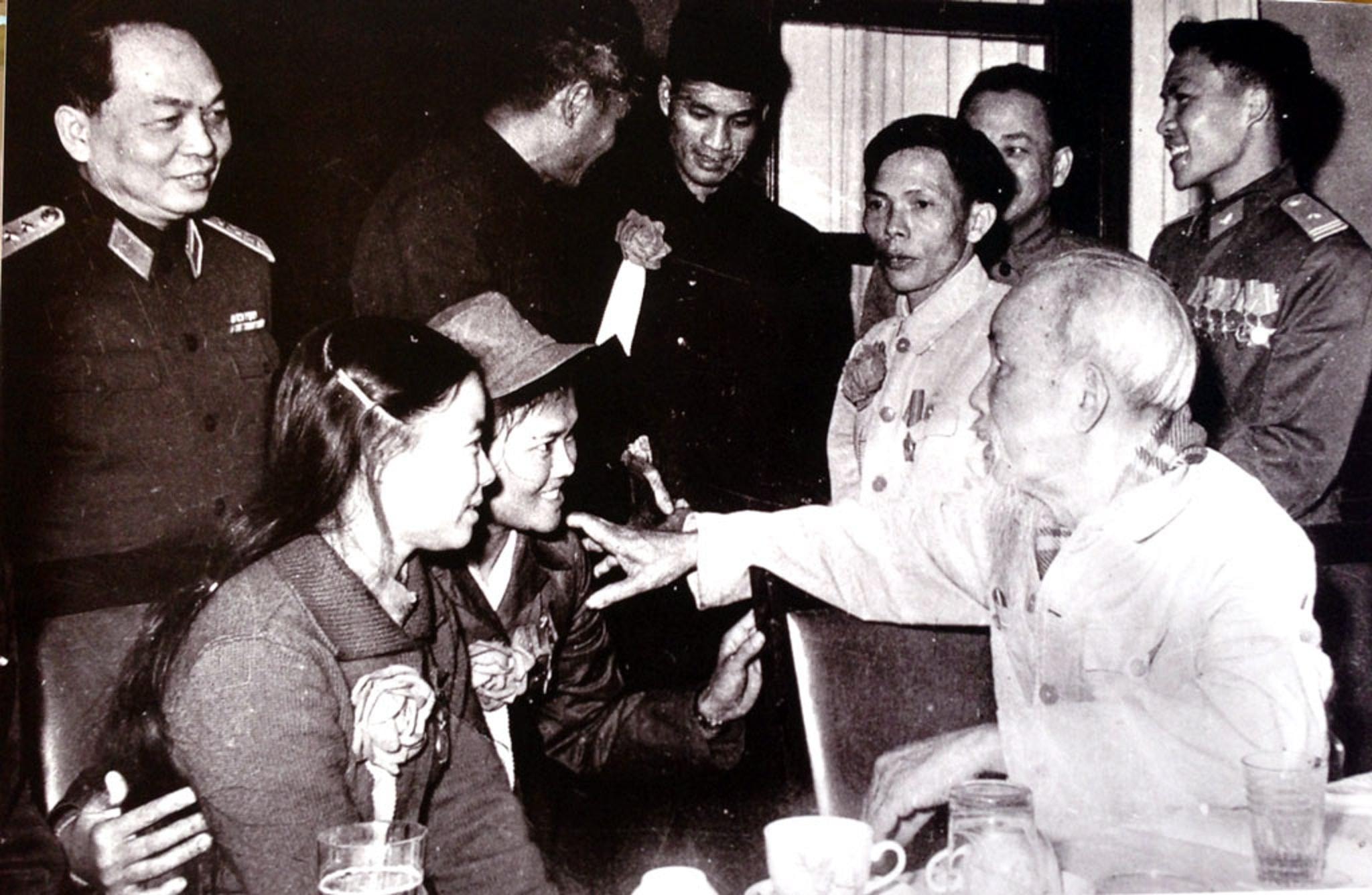Our people's tradition of respecting women
(Baonghean.vn) - On March 8, 1952, President Ho Chi Minh talked about the role of women: "The beautiful landscape of Vietnam is woven and embroidered by our women, young and old, to make it more beautiful and brilliant."
Good tradition
 |
The first mother of the Vietnamese people was Mother Au Co. She gave birth to a hundred eggs that hatched a hundred children. Fifty children followed Mother Au Co into the forest and established the Van Lang State: “Mother brought me to Tan Vien/ To repair the foundations, to maintain the scale/ How many hills and mountains/ The ramparts were arranged, the land was divided”(Southern sayings).
Regarding the story of Lac Long Quan and Au Co, Professor Vu Duc Vuong (former Director of the General Education Program at Hoa Sen University) commented: “In addition to teaching us about our origins, it is also a very beautiful and humane love story, and is the clearest history page about gender equality of the primitive Vietnamese people”. Therefore, Professor Vu Duc Vuong affirmed: “The story of Mother Au Co and Father Lac Long has become the cornerstone of Vietnamese culture”.
 |
In the spring of the year Canh Ty 40, the two sisters Trung Trac - Trung Nhi raised the flag of uprising against the Han Dynasty and restored autonomy to the Vietnamese people. Historian Le Van Huu of the Tran Dynasty in "Dai Viet Su Ky Toan Thu" commented: "Trung Trac and Trung Nhi were women, shouting once and the districts of Cuu Chan, Nhat Nam, Hop Pho, and 65 cities in Linh Ngoai all responded, establishing the country and proclaiming themselves kings was as easy as turning one's hand, it can be seen that the terrain of our Vietnam is enough to establish a hegemonic career". "Dai Nam Quoc Su Dien Ca" of the Nguyen Dynasty also commented about the Trung Sisters: "First is righteousness, then is loyalty. In history, who is more heroic?"
The idea of despising women is condemned!
 |
Our country was influenced by the feudal ideology of China starting from the period of Northern domination. Chinese feudal society was a patriarchal society originating from the Han nomadic origin, existing for thousands of years with unjust and strict concepts, giving all priorities and privileges to men and pushing women to the lowest position in the family as well as society. It was reinforced by Confucianism - a measure to strengthen feudal hierarchy. All activities of women were encapsulated in the rules: "At home, obey your father, when married, obey your husband, when the husband dies, obey your son". That is: At home, obey your father, when married, obey your husband, when the husband dies, obey your son (three obediences). Especially the concept of male superiority over female: "One son is enough, ten daughters are nothing" (One son is enough, but ten daughters are nothing).
However, the Vietnamese people's social and spiritual foundation is very allergic to this. There is no such thing as Vietnamese men looking down on women because women are the masters of the kitchen, the ones who hold and distribute the family economy due to their agricultural culture and sedentary lifestyle: ""Without a man, the house is lonely, without a woman, the kitchen is lonely", "Men build houses, women build homes".In particular, women play a more important role than men when making specific decisions: “"His order is not equal to her gong".And when giving birth, Vietnamese people prefer to have a daughter as their first child: ""A deep field and a buffalo are not worth a first-born daughter."Even Vietnamese women always attack the idea of polygamy. Therefore, they tell each other: “When hungry, eat a handful of fig leaves/ If you have a husband, marry him, if you share a husband, don't.Lady Trieu also once affirmed: "I only want to ride the strong wind, step on the fierce waves, kill the whales in the East Sea, drive out the Wu army, regain the country, and free myself from slavery. I will not bow down to be someone else's concubine."
The Hong Duc Law of the Le Dynasty guaranteed that daughters had equal rights to inherit property as sons. Daughters and granddaughters had the right to burn incense for their parents in cases where there were no sons or grandsons in the family (Articles 391 and 395); if the eldest son was still young, the widow had the right to perform the ancestral worship on his behalf. In marriage, the law gave women the right to break off the marriage if they saw that their fiancé was unfortunately disabled, committed a crime or went bankrupt (Article 322). Article 308 allowed a wife to leave her husband if he abandoned her within 5 months and did not come back. In a divorce, the property owned by the person before the marriage was returned to that person, while the common property created by the couple was divided equally between them.
During the Nguyen Dynasty, the great poet Nguyen Du did not translate the Kim Van Kieu story by Thanh Tam Tai Nhan in China into Vietnamese, but only relied on the plot to write a new purely Vietnamese poem, a poem that carries the profound humanistic thoughts of the Vietnamese people about women. The ideas of contempt for women in feudal Chinese society such as viewing women as goods to be bought and sold, valuing women's virginity... were condemned by the great poet Nguyen Du in the Tale of Kieu. In particular, the word "Trinh" in Kieu, according to the great poet Nguyen Du, is ""take filial piety as chastity".Commenting on this, poet To Huu once wrote in the poem "Spring Song 1961" that: "After going through a life of ups and downs/ The poem still contains the pain of human love/ The ups and downs of a drifting life/ Oh To Nhu, tears flow around Kieu's body".That is why The Tale of Kieu has such a strong vitality in the hearts of our people! It is an attitude of our people towards the old-fashioned social concepts and etiquette of Chinese Confucianism.
Completely liberate women
 |
In his work “The Revolutionary Path” (1927), President Ho Chi Minh quoted Karl Marx: “Anyone who knows history knows that if we want to reform society without the help of women, it is impossible” and Lenin: “The revolutionary party must teach women how to cook and do national work, only then can the revolution be called a success”. He also stated: “Lenin taught us: women are half of society. If women are not liberated, then society is not liberated at all”.
Therefore, in the Party Founding Conference in February 1930, President Ho Chi Minh stated a major policy on the social aspect after gaining national independence: "realizing gender equality". In our country's "Declaration of Independence" (September 2, 1945), he did not quote verbatim from the 1776 American "Declaration of Independence". The American declaration stated "that all men are created equal". He wrote: "All men are created equal".
In Article 1, Article 9, Article 18 of the 1946 Constitution of our country, it is stipulated that: "Women are equal to men in all aspects". Placing his faith in the proactive role of women in studying, working and creating, President Ho Chi Minh believed that: "Under socialism and communism, brave women can complete all tasks that brave men can do, even though those tasks require a lot of talent and determination, such as piloting the Oriental spaceships".
Ms. Nguyen Thi Binh, former Vice President, commented: “President Ho Chi Minh was the one who initiated the path to liberating Vietnamese women. He awakened women to participate in liberating the nation, liberating humanity and thereby liberating themselves”. Ms. Ketherine Muller - Marin, Chief Representative of the United Nations Educational, Scientific and Cultural Organization (UNESCO) Office in Vietnam, at the celebration of the 120th anniversary of President Ho Chi Minh's birthday in 2010, commented: “He also cared about the rights and role of women in society… For UNESCO, gender equality is a necessary condition to achieve international development goals".
In the 2013 Constitution of our country, women are not only equal to men but also given priority as: “The State, society and family create conditions for women to develop comprehensively and promote their role in society” (Clause 2, Article 26); “The State protects marriage and family, protects the rights of mothers and children” (Clause 2, Article 36); “The State, society and family have the responsibility to protect and care for the health of mothers and children, and implement family planning” (Clause 2, Article 58). In the Political Report at the 13th National Congress of our Party, it was also clearly stated: “Promoting the traditions, potentials, strengths and spirit of mastery, aspirations of women of all classes. Building Vietnamese women of the new era”./.
